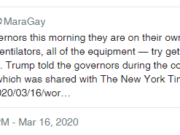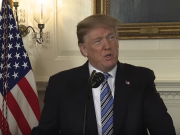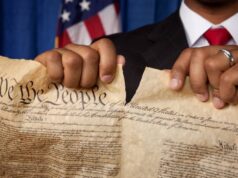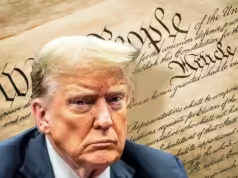As between President Trump and Judge Robart, one of these two men has improperly and incorrectly exceeded the scope of their legal authority. Remarkable as it may seem to some, it’s not Mr. Trump. The War on Trump continues on every front, including in the Courts where the rule of law is supposed to vanquish the tomfoolery of politics. Unfortunately, the prism of politics bends the bright light of the law as well, creating distortions that fit a political agenda. The State of Washington has no standing before the federal court, and thus Judge Robart’s Temporary Restraining Order (“TRO”) is improper. Judge Robart got that analysis wrong. His order and opinion, as we noted, gave no legal analysis, which best explains the result. As the DOJ points out in its legal brief, the State has no basis to step into the shoes of its residents to take over whatever legal claims they may have. In the absence of a statutory grant or other applicable federal law, the State has no standing to challenge the Executive Order (“EO”) of President Trump under 8 USC 1182(f). Likewise, this judge has no basis in law or fact to issue a national injunction outside the confines of his jurisdiction and authority. He cites no legal basis for doing so, but rather opines that uniformity of immigration laws requires him to do so. Without any legal right, he expands his own jurisdiction and nullifies the ruling of another district court that upheld the order. That is about as lawless as a judge can be. It is ironic indeed that a federal judge would exceed his own authority to issue an injunction that claims the President exceeded his proper authority.
In this case, the President has two undeniable rights. The first right was to issue an Executive Order that bans a designated class of aliens from entry into the United States. The second right was to be unhappy with a Judge who was wrong on the law and on the scope of his own powers. As noted here, however, the President still has no business attacking the legitimacy of the Judge. What gives President Trump the power to block the entry of any “alien” into the United States, including alien holders of a US Visa? The answer is in the law. Now, you don’t have to like the law, nor the President’s use of it in these circumstances or against the class so defined. However, the rights of the President under 1182(f) are not subject to challenge by the State of Washington. Here is the relevant part of the law, passed by Congress and signed by a prior President:
(f)Suspension of entry or imposition of restrictions by President
Whenever the President finds that the entry of any aliens or of any class of aliens into the United States would be detrimental to the interests of the United States, he may by proclamation, and for such period as he shall deem necessary, suspend the entry of all aliens or any class of aliens as immigrants or nonimmigrants, or impose on the entry of aliens any restrictions he may deem to be appropriate.
That statement of the law is clear, unambiguous, and not subject to wiggle room. Should a president have such broad powers? Is this law a good policy? Those are political and policy questions resolved initially through the proper passage of a bill into law. He does have this authority, and it was properly granted to him by Congress. As various special interests groups run to the court to file Amici briefs — friend of the court briefs – all of them ignore this legal power and instead focus on perceived issues of fairness, religious intolerance, and various other non-legal arguments. It’s embarrassing, frankly, to see law professors or lawyers sign off on these political documents that are not well-grounded in law, nor a good-faith extension thereof. Even purported pure federalists like Professor Ilya Somin of George Mason have penned incorrect, irresponsible, and indeed politically motivated pieces suggesting the President’s EO is unconstitutional. The ultimate exercise of federalism is when a President uses the power vested in him by the law as written, passed, and executed by a prior Congress and President. Somin’s recent op-ed suggesting that the EO is unconstitutional because of prior statements of Presidential supporter, Rudy Giuliani, is political sophistry masquerading as legal analysis. Somin is an insanely smart law professor whose open border’s beliefs sometimes cloud his legal analysis, which when properly focused, is almost always laudable.
If legal scholars want to make an argument that 8 USC 1182(f) is unconstitutional, that’s a kettle of a different fish. I am not sure how they might do so under the present EO. The President’s order targets aliens who originate from seven countries that Congress, President Obama, and the intel community, identified as the biggest terror risks. Indeed, three of those counties are on the state-sponsored terror list. Since the EO is based on national security matters as established by the entirety of our government, and it makes no distinction with respect to religion or other classification, there is no basis to attack the it on Constitutional grounds. In fact, I’d be hard pressed to see how such an attack with respect to aliens under this provision could be successful even if it clearly delineated a specific religious group. Objectionable, it might be, but unconstitutional is highly unlikely.
To be clear, the President’s EO had issues, and I wrote about them. In fact, it is undeniable that with respect to some visa holders, they may have been denied “due process” rights afforded them by virtue of the prior visa status. While a visa may be revocable, even a visa affords some rights to aliens if they are present in the US and subject to the jurisdiction thereof. However, the right of the President under this statute to deny alien entry into the US is without limitation. The Court had no basis to issue the TRO. It had no basis to issue a national TRO. It is clear that with respect to over-stepping the lawful bounds of jurisdiction, it was the Court that did so, not the President executing his proper legal authority.
Author: Richard Kelsey
Richard Kelsey is the Editor-in-Chief of Committed Conservative.
He is a trial Attorney and author of a #11 best-selling book on Amazon written on higher education, “Of Serfs and Lords: Why College Tuition is Creating a Debtor Class”
Rich is also the author of the new Murder-Mystery series, “The ABC’s of Murder,” book one is titled, “Adultery.”
Rich is a former Assistant Law School Dean and Law Professor. At Mason Law Kelsey conceived of, planned, and brought to fruition Mason’s Center for the Protection of Intellectual Property, known as CPIP, drawing on his expertise as a former CEO of a technology company specializing in combating cyber-fraud.
In 2014 he was elected by the graduating class as the faculty speaker at their graduation.
He is a regular commentator on legal and political issues in print, radio and on TV. Rich has appeared on hundreds of stations as a legal expert or political commentator. He provided the legal analysis for all stages of the Bob McDonnell trial and appeal for numerous outlets including NPR and WMAL.
Rich also writes on occasion for the American Spectator and CNSNews.com.
In his free time, Rich is part of the baseball mafia of Northern Virginia, serving on numerous boards and as a little league and travel baseball coach.
His Twitter handle is @richkelsey.
































